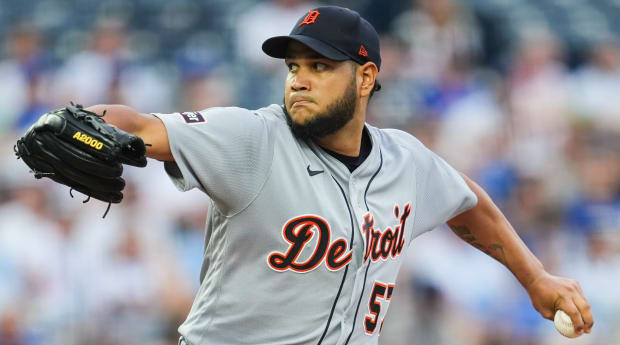On Wednesday afternoon, Eduardo Rodriguez did his job on his terms, exactly where he wanted to be.
The Tigers starter allowed two runs in six innings for a win over the Pirates. It continues a career year for the 30-year-old: His 2.96 ERA marks a personal best in eight MLB seasons. Which is exactly why the Tigers wanted to trade him this week and part of why he didn’t want them to.
Detroit tried to broker a deal for Rodriguez on deadline day. But the front office proposed a swap with the Dodgers, one of 10 clubs in the no-trade clause in Rodriguez’s contract, and one for which he declined to waive the clause. Rodriguez cited his desire not to be too far from his Florida-based family. He also spoke more broadly about his appreciation for where he is right now.
“I love the guys here, and I feel like they love me, too … I know we have a really good team, and we have a really good future over here with the young guys here,” Rodriguez told the media on Wednesday, per MLB.com’s Jason Beck. “I want to be part of it, and that’s why I decided to stay here, too.”
If it felt surprising, well, it probably should have. Any player with a no-trade clause has the right to exercise it as he sees fit: The clause is as much part of his deal as his salary is. But there are contexts where that seems more clear-cut than others.

Jay Biggerstaff/USA TODAY Sports
There are no-trade situations where it seems obvious that a player might decline to waive the clause—when he is being asked to go from a good team to a bad one, or a club with obviously dysfunctional management, or a roster where his playing time would clearly be compromised. (Hello, Eric Hosmer in 2022.) But in a context like this? It can be easy to see the clause as a mere technicality. In this scenario—a proposed trade where the best performer on a losing team would be moved to bolster a playoff contender—waiving the provision can seem like a foregone conclusion. Both Max Scherzer and Justin Verlander had no-trade clauses in their deals with Mets, for instance, and look where those ended.
But individual preferences are more textured, more hidden, more potentially eccentric than that. It can be easy to assume in the specific, limited context of a baseball contract that everybody should want the same basic things: Everybody wants money. Everybody wants success. Everybody wants to play for a winning team. Everybody would rather be with the Dodgers than the Tigers, both as a general principle and as one specific to this moment, with the Dodgers in possession of both first place and a clear forward trajectory and the Tigers in possession of neither. But it can’t always be that straightforward. Life is more than baseball, and besides, all of those points mean different things to different people. The human heart can be inscrutable. We are all kaleidoscopes of passionate, nebulous personal preferences, and Eduardo Rodriguez would prefer not to leave the Tigers for the Dodgers.
None of that makes this moment look any better for Detroit’s front office. This is not a full no-trade clause; Rodriguez specified just 10 teams to which he could not be moved. That left 19 potential others. Not all of those found themselves in the mix for a starting pitcher this July, of course, but rotation depth is a popular need among contenders. It’s hard to imagine there wasn’t some workable alternative here. If the Tigers were truly committed to moving Rodriguez this summer—in the middle of a career year and before an opt-out in his contract—they presumably had some mutually agreeable pathways to doing that. And the same goes for the Dodgers. If they were truly committed to getting one more starting pitcher—and they should have been!—they too had other pathways.
As for Rodriguez? He’s currently having the season of his life in Detroit. Judging by his performance on Wednesday, he’ll keep having it, right where he wants.







